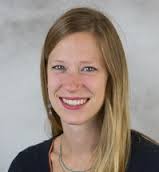Amelia Hritz, the first student in Human Development's Dual PhD and JD Program in Developmental Psychology and Law, was featured in a recent post reprinted from the Cornell Law School website, May 17, 2017.

Two weeks before its 2017 convocation, Cornell Law School celebrated twenty-two, soon-to-be graduates who received coveted judicial clerkships. The celebration included a champagne toast by faculty, alumni, and staff at Myron Taylor Hall.
The event was the first of its kind to highlight the growing number of graduates who clerk for judges at all levels of the state and federal court systems across the country. The future clerks were honored by Eduardo Peñalver, the Allan R. Tessler Dean and Professor of Law; John Blume, the Samuel F. Leibowitz Professor of Trial Techniques; and Judge Richard Wesley ’74 of the U.S. Court of Appeals for the Second Circuit.
"Over the last decade, we've definitely seen an increase in the number of clerkships for each graduating class," said Elizabeth Peck, assistant dean for professional development and clerkships. "Clerkships have become a much greater priority for our institution."
One way the Law School has made a stronger commitment to clerkships was by creating a new position for Peck to help current law students and recent graduates land clerking positions. The Clerkship Celebration, held on April 26, is another way the law school is highlighting the value of clerkships.
"Securing a judicial clerkship is a 'capstone event' based on years of hard work and academic excellence, both before our students arrive at Cornell and during their time here with us, high above Cayuga's waters," Blume, chair of the faculty clerkship committee, said at the event.
Amelia Courtney Hritz, ’17, who is working on a Ph.D. in Cornell's joint program in developmental psychology and law, was one of the graduates honored at the celebration. She will clerk for Judge Peter Hall ’77 of the U.S. Court of Appeals for the Second Circuit for a one-year term beginning in 2019.
"I'm excited to learn more about how judges think by observing what types of legal arguments are persuasive to Judge Hall," Hritz said. "I think that by clerking I will gain a different perspective and become a better lawyer."
Hritz, former editor in chief of the Cornell Law Review, said she became interested in the Second Circuit when the Law Review published a special volume containing biographies of all the judges who served on the court for its 125th anniversary last year. She decided to pursue clerking while taking the class, Federal Appellate Practice, which Wesley and Blume co-taught last fall.
Peck, a former clerk herself, said clerking for a judge allows graduates to sharpen their skills in a number of areas, including legal research and writing. "It also provides clerks with a lifelong mentor and great networking opportunities," she said. "It's the kind of credential that will be valuable for the rest of their careers."

